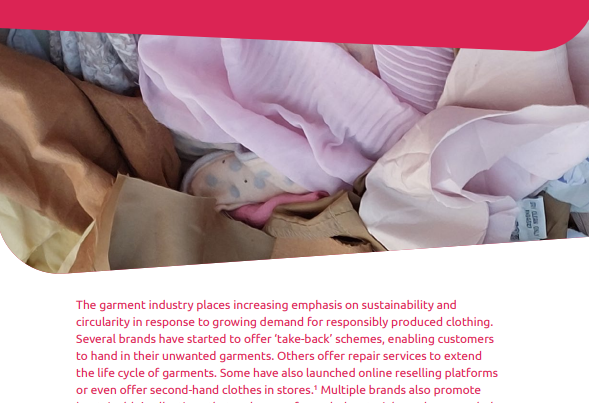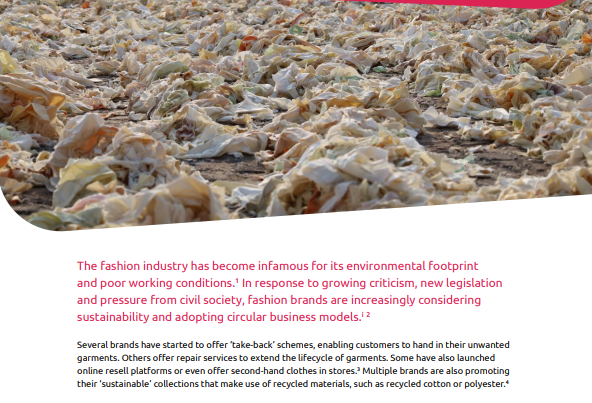Ondanks mooie beloften nog steeds misstanden in de Zuid-Indiase kledingfabrieken, onthult nieuw rapport ‘Maid in India’
Persbericht SOMO/LIW
25 april 2012
Europese en Amerikaanse kledingbedrijven zijn er tot nu toe niet in geslaagd de arbeidsomstandigheden bij hun toeleveranciers in Tamil Nadu, Zuid-India, structureel te verbeteren. Ondanks mooie beloften en een aantal goedbedoelde initiatieven zijn de arbeidsomstandigheden in de Zuid-Indiase kledingindustrie nog steeds zeer slecht. Tot op de dag van vandaag werken duizenden vrouwen en meisjes onder omstandigheden die niet anders kunnen worden aangeduid dan als gebonden arbeid. Dit stellen Stichting Onderzoek Multinationale Ondernemingen (SOMO) en de Landelijke India Werkgroep (LIW) in hun rapport Maid in India dat vandaag wordt gepubliceerd.
Vervolgonderzoek
Maid in India is het vervolg op het rapport Captured by Cotton uit 2011 dat de uitbuiting in de kledingindustrie in Tamil Nadu beschreef. In reactie op dit rapport beloofden Europese en Amerikaanse kledingbedrijven een einde te maken aan de arbeidsmisstanden. Nu, een jaar later, maken SOMO en LIW de balans op, op basis van uitgebreid veldonderzoek inclusief interviews met ruim 180 vrouwelijke werkneemsters, en een analyse van exportgegevens. Ook is onderzoek gedaan naar MVO-initiatieven waar merken en kledingzaken bij aan zijn gesloten. Meer dan 70 westerse kledingmerken en kledingzaken werden in het onderzoek meegenomen. Hieronder bekende namen zoals C&A, Diesel, American Eagle Outfitters, Primark, Decathlon, Philips van Heusen (Tommy Hilfiger) en Quicksilver. Ook het Britse inkoopconcern Crystal Martin dat doorverkoopt aan bekende kledingmerken figureert in het rapport. U vindt de volledige lijst van de afnemers die in het rapport genoemd worden, hier.
Maid in India zoomt in op vier grote kledingproducenten in Tamil Nadu: K.P.R. Mill, Bannari Amman, SSM India en Eastman Exports. Het rapport beschrijft die stappen die bedrijven hebben genomen om de situatie in de Indiase kledingfabrieken te verbeteren, maar concludeert dat ernstige mensenrechtenschendingen blijven voortduren.
Belangrijkste problemen
Werkneemsters van deze producenten komen uit Tamil Nadu en andere delen van India. De overgrote meerderheid is jonger dan 18, heeft een Dalit-achtergrond (kastelozen), en is van zeer arme afkomst. Deze meisjes worden gelokt met de toezegging van een redelijk salaris, goede behuizing en – in enkele gevallen – een geldbedrag na afloop van het contract dat ze kunnen gebruiken voor hun bruidsschat. Dit staat bekend als ‘Sumangali Scheme’.
Deze werkneemsters wonen vaak in hostels op het fabrieksterrein waar ze zelden vanaf mogen. Ze hebben weinig contact met hun familie, laat staan met vakbonden of NGO’s. De meisjes maken lange dagen, inclusief gedwongen overwerk tot soms zelfs wel 24 uur aan een stuk, voor lage lonen en onder ongezonde omstandigheden. Intimidatie en geweld komen veel voor. Meestal is het uitdienen van de contractperiode een voorwaarde voor het ontvangen van het beloofde geldbedrag dat in feite geen bonus is, maar ingehouden loon. Zelfs als het de meisjes lukt de termijn uit te dienen, dan nog ontvangen ze niet altijd het ingehouden loon. Vakbonden zijn zwak en kampen met enorme tegenwerking. Vooral in de katoenspinnerijen is de situatie uiterst zorgwekkend.
Wat moet er gebeuren?
Kledingbedrijven hebben in 2011 beloofd een eind te maken aan de misstanden bij hun toeleveranciers. Enkele bedrijven maken deel uit van MVO-initiatieven; anderen ontwikkelen hun eigen aanpak en onderwerpen hun toeleveranciers aan zogenaamde ‘social audits’. Bekende namen lopen het hardst, lijkt het. De meeste afnemers doen echter niets, concluderen SOMO en LIW.
Om de voortdurende mensenrechtenschendingen te kunnen bestrijden is een gezamenlijke aanpak vereist, met concrete en meetbare mijlpalen, waarbij de hele toeleveringsketen wordt aangepakt tot en met de weverijen en spinnerijen aan toe. MVO-initiatieven, certificeringsinstellingen en brancheorganisaties zoals Modint en Mitex, moeten hun leden oproepen tot concrete maatregelen. Aan nalatigheid behoren disciplinaire maatregelen verbonden te worden. Vakbondsvrijheid en de mogelijkheid tot collectieve arbeidsonderhandelingen zijn essentieel om arbeiders in staat te stellen zelf voor hun rechten op te komen. Westerse bedrijven die afnemen in Zuid-India moeten zich actief inspannen voor het realiseren van deze rechten.




